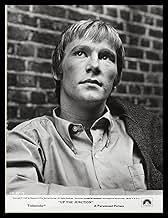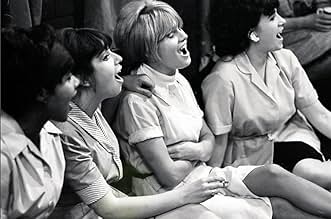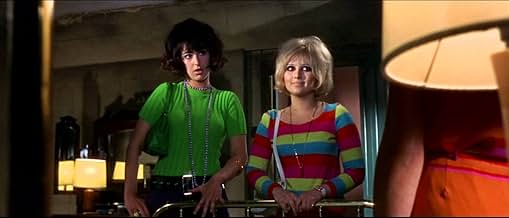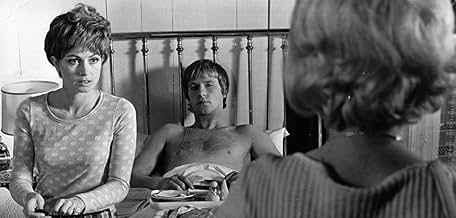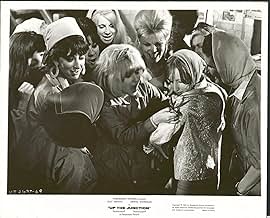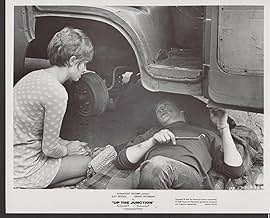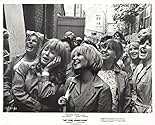PUNTUACIÓN EN IMDb
6,9/10
1,1 mil
TU PUNTUACIÓN
Añade un argumento en tu idiomaAddresses some of the major 60s social issues - a bored rich London-girl from Chelsea decides to go "slumming" in depressed Battersea, getting a flat and starts factory-work and makes friend... Leer todoAddresses some of the major 60s social issues - a bored rich London-girl from Chelsea decides to go "slumming" in depressed Battersea, getting a flat and starts factory-work and makes friends... of which one has to get an illegal abortion.Addresses some of the major 60s social issues - a bored rich London-girl from Chelsea decides to go "slumming" in depressed Battersea, getting a flat and starts factory-work and makes friends... of which one has to get an illegal abortion.
- Dirección
- Guión
- Reparto principal
- Premios
- 1 nominación en total
Reseñas destacadas
This is one of my all time favourite films. OK so the plot is not fantastic ( certainly better than some of the same era !! ), but anyone who loves the 60's will revel in its nostalgia, the cars, the buildings, the fashions.... simply superb!, it all harks back to a much more simpler, although harder way of life. I was born in the 60's & love the 50's/60,s era, this film started my interest in films of this time, so if you love this film then also see :- A KIND OF LOVING. LONELINESS OF A LONG DISTANCE RUNNER. POOR COW. LEATHER BOYS. CATHY COME HOME. Saturday NIGHT , Sunday MORNING. SMASHING TIME. HERE WE GO ROUND THE MULBERRY BUSH. BILLY LIAR. A TASTE OF HONEY. SPARROWS CANT SING. GIRL WITH GREEN EYES. A KID FOR 2 FARTHINGS. TO SIR WITH LOVE. So close the curtains, put the cat out, turn the lights off & watch this film.... you will be hooked, i promise !
Up The Junction was made during the Summer of 1967 though there isn't much love & peace to be found in this film. Arguably the only likeable characters are Polly, an uptown girl who's trying to slum it in Battersea, and Pete (Dennis Waterman) the 'bit of rough' she falls for, and they're not without flaws. I always loved Dennis Waterman in Minder and his character in this film could easily pass for a young Terry McCann; anyone who doubts his ability as a straight actor should watch the showdown between Pete and Polly in the hotel room. The two sisters Sylvie and Rube are sweet & bubbly on the outside but later on reveal a nasty side, especially when mocking a work colleague who appears to have learning difficulties.
Apart from Pete, all the men are depicted as selfish, sex mad and prone to violence.
Up The Junction came out a few years after the golden age of kitchen sink drama, and maybe lacks their gritty Northern humour, but there's still plenty to recommend including some lovely, sweeping London skylines, nice views of the iconic Battersea power station, and a groovy soundtrack by Manfred Mann. Anyone nostalgic for the late 1960s will probably enjoy it.
Apart from Pete, all the men are depicted as selfish, sex mad and prone to violence.
Up The Junction came out a few years after the golden age of kitchen sink drama, and maybe lacks their gritty Northern humour, but there's still plenty to recommend including some lovely, sweeping London skylines, nice views of the iconic Battersea power station, and a groovy soundtrack by Manfred Mann. Anyone nostalgic for the late 1960s will probably enjoy it.
Peter Collinson was already mellowing after his directorial debut with the incredibly nasty home invasion film 'The Penthouse' (1967); and let loose on Nell Dunn's stories in Technicolor with Manfred Mann on the soundtrack was obviously going to turn in a very different film from Ken Loach's 'Wednesday Play' of 1965.
What seemed like gritty realism in 1967 today seems as remote as the world evoked by Dickens (complete with Jewish stereotypes which really date it). Maureen Lipman is almost unrecognisably young and it's always good to see Adrienne Posta and Liz Fraser (who share a literally gut-renching sequence after the former has an abortion performed by a drunken Hylda Baker).
But the real star is Battersea power station, looming in the background back in the days when it was still permitted to smoke.
What seemed like gritty realism in 1967 today seems as remote as the world evoked by Dickens (complete with Jewish stereotypes which really date it). Maureen Lipman is almost unrecognisably young and it's always good to see Adrienne Posta and Liz Fraser (who share a literally gut-renching sequence after the former has an abortion performed by a drunken Hylda Baker).
But the real star is Battersea power station, looming in the background back in the days when it was still permitted to smoke.
Though justifiably not considered a particularly important British film of the late sixties, "Up The Junction" has much genuine charm and remains a film for which I have a lot of affection.
Written by Nell Dunn, who specialized in portraying working class life, the characters are well drawn and brought to life with much conviction by a fine cast, some of whom have lasted and some who somehow faded away.
Whereas leading man Dennis Waterman went on to a long career in both television and on the stage, the lovely Suzy Kendall, who seemed to be headed towards becoming the next Julie Christie, proceeded to an undistinguished career. There's a touching chemistry between the pair.
Likewise the strong supporting players have had varied careers. The pairing of Maureen Lipman and Andrienne Posta was so successful in this film, that there was talk of them becoming a comedy team. Like Waterman, Lipman has been a regular on television and the stage, while Posta simply vanished.
"Up the Junction" too has vanished into obscurity, without even a video release. It's odd that while other far lesser British movies of the same period have been kept alive, this small but very appealing work should suffer such a fate.
Written by Nell Dunn, who specialized in portraying working class life, the characters are well drawn and brought to life with much conviction by a fine cast, some of whom have lasted and some who somehow faded away.
Whereas leading man Dennis Waterman went on to a long career in both television and on the stage, the lovely Suzy Kendall, who seemed to be headed towards becoming the next Julie Christie, proceeded to an undistinguished career. There's a touching chemistry between the pair.
Likewise the strong supporting players have had varied careers. The pairing of Maureen Lipman and Andrienne Posta was so successful in this film, that there was talk of them becoming a comedy team. Like Waterman, Lipman has been a regular on television and the stage, while Posta simply vanished.
"Up the Junction" too has vanished into obscurity, without even a video release. It's odd that while other far lesser British movies of the same period have been kept alive, this small but very appealing work should suffer such a fate.
I first saw this film on late night TV in Melbourne, Australia, in the late 1980s. I love it then, but wasn't able to view it again until recently, and enjoyed it as much as my first viewing almost 30 years earlier.
One of the first things I remembered thinking after first viewing it is – why isn't this film better known? It's one of the great British films of the 1960s, and a fine example of the 'kitchen sink' genre. Added to that, it has superb widescreen cinematography – every scene is beautifully shot, the outdoor scenes particularly so. Working class London in the 60s was a ramshackle, beautiful if run-down environment. The film captures a lost world – it's a fascinating historical document as well as a serious movie.
The cast is spot on,it's all very believable, and the leads have a genuine chemistry. Suzy Kendall may have had a limited acting range – but she's perfect in this role. And so beautiful!
The story tackles all manner of social problems not just of the 60s, but universal ones applicable today as then. Some scenes are still quite disturbing to watch – this is not some 'swinging London' expose, but an accurate glimpse in to the life of working class Londoners before the gentrification process started.
I was fortunate to study British film at Monash Univeristy (Melbourne) under the great Brian MacFarlane in the 1990s. He's considered the world expert on British cinema, and was commissioned by the British Film Academy to write the authorised history of British cinema. One of the things MacFarlane consistently highlighted was the fact Brit film only began to portray the working class seriously from the late 1950s. Prior to that, working class were portrayed in movies as either servants, idiots, criminals or downtrodden miners etc. Up the Junction is a beautifully realised example of a time when the British finally began to take the working class seriously.
It's also the first film I can think of with a soundtrack written by a well known rock band – Manfred Mann. And though dated – the music is perfect for this film and captures something of the youth vibe then flowering across the western world. Truly – this is a shamefully underrated film and a must-see for anyone interested in London in the 1960s.
One of the first things I remembered thinking after first viewing it is – why isn't this film better known? It's one of the great British films of the 1960s, and a fine example of the 'kitchen sink' genre. Added to that, it has superb widescreen cinematography – every scene is beautifully shot, the outdoor scenes particularly so. Working class London in the 60s was a ramshackle, beautiful if run-down environment. The film captures a lost world – it's a fascinating historical document as well as a serious movie.
The cast is spot on,it's all very believable, and the leads have a genuine chemistry. Suzy Kendall may have had a limited acting range – but she's perfect in this role. And so beautiful!
The story tackles all manner of social problems not just of the 60s, but universal ones applicable today as then. Some scenes are still quite disturbing to watch – this is not some 'swinging London' expose, but an accurate glimpse in to the life of working class Londoners before the gentrification process started.
I was fortunate to study British film at Monash Univeristy (Melbourne) under the great Brian MacFarlane in the 1990s. He's considered the world expert on British cinema, and was commissioned by the British Film Academy to write the authorised history of British cinema. One of the things MacFarlane consistently highlighted was the fact Brit film only began to portray the working class seriously from the late 1950s. Prior to that, working class were portrayed in movies as either servants, idiots, criminals or downtrodden miners etc. Up the Junction is a beautifully realised example of a time when the British finally began to take the working class seriously.
It's also the first film I can think of with a soundtrack written by a well known rock band – Manfred Mann. And though dated – the music is perfect for this film and captures something of the youth vibe then flowering across the western world. Truly – this is a shamefully underrated film and a must-see for anyone interested in London in the 1960s.
¿Sabías que...?
- CuriosidadesLulu turned down the role of Rube.
- PifiasWhen Sylvie and Rube are singing in the pub, there are many cutaways which show the pub customers joining in the songs. On most of these, a large piece of dirt is visible at the top of the frame. Someone didn't perform the obligatory "hair in the gate" check before loading the film.
- ConexionesFeatured in Film Review: Backs British Films (1968)
- Banda sonoraUp The Junction (Main Title)
Written by Mike Hugg and Manfred Mann
Selecciones populares
Inicia sesión para calificar y añadir a tu lista para recibir recomendaciones personalizadas
- How long is Up the Junction?Con tecnología de Alexa
Detalles
- Fecha de lanzamiento
- País de origen
- Idioma
- Títulos en diferentes países
- Чуть выше по перекрёстку
- Localizaciones del rodaje
- Beach Hotel, Marine Parade, Worthing, West Sussex, Inglaterra, Reino Unido(hotel where Pete and Polly stay)
- Empresas productoras
- Ver más compañías en los créditos en IMDbPro
- Duración1 hora 59 minutos
- Mezcla de sonido
- Relación de aspecto
- 2.35 : 1
Contribuir a esta página
Sugerir un cambio o añadir el contenido que falta

Principal laguna de datos
By what name was Up the Junction (1968) officially released in India in English?
Responde
